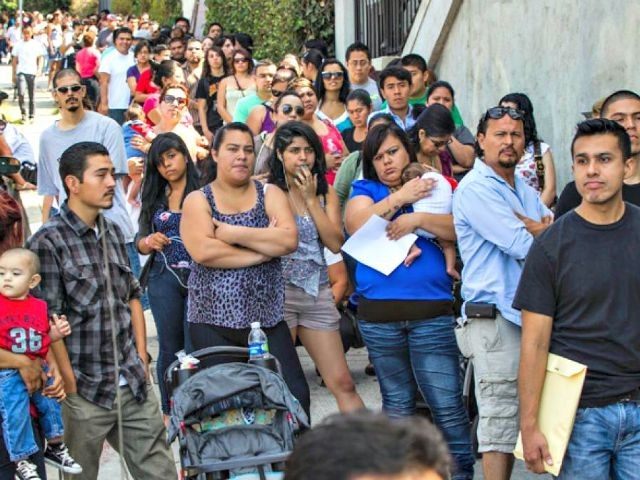A new study shows that the supply of migrant workers in the United States is huge, and that the wages paid by their employers are being supplemented by taxpaying Americans.
Among households that include at least one working migrant, 51 percent are paid so little that American taxpayers provide extra payments, including welfare, medical insurance, food, cash and housing, according to the new report by the Center for Immigration Studies. “Work does not equal self-sufficiency… This means that bringing workers into the country to fill low-wage jobs will often create very large costs for taxpayers in the form of welfare,” the report concluded.
Without the current annual supply of at least 2 million new migrant workers, companies would be forced to bid for the limited supply of Americans workers by offering higher wages. That marketplace process last happened in 1999, and the higher wages reduced poverty and taxpayer-funded welfare payments.
Much of the federal money paid by Americans to help lift migrants out of poverty also becomes revenue for the companies that advocate for more migrant workers. That’s because migrant workers end up spending the taxpayers’ funds at retail stores and fast-food outlets.
“One [way] is produce more customers [is] through immigration,” Google chief Eric Schmidt boasted at a March 18 event arranged by the American Enterprise Institute.
The low wages paid to migrants are also boosting the political pressure for higher minimum wages. For example, a growing number of Democratic advocates say the minimum wage should be raised to $15 per hour. Republicans too, including 2016 candidate Gov. John Kasich, also endorse a raise in the current minimum wage, now $7.25 per hour.
But any higher minimum-wage — if adopted — would become an additional way that Americans will be forced to supplement the low wages paid by companies to their imported foreign workers.
Currently, the federal government does little to enforce immigration laws, instead welcoming record numbers of legal foreign workers.
As a result, the four million Americans who enter the workforce each year face job-competition from at least two million new legal immigrants, legal temporary visitors and legal guest-workers, plus the competition from a growing population of roughly 8 million working illegal immigrants.
Unsurprisingly, Americans’ wages have been flat since at least 2000, while profits and stock values have soared, boosting the wealth of political donors.
An Iowa poll showed that 84 percent of respondents think that Donald Trump’s plans would improve economic conditions for the middle class.
Overall, the poll showed that 23 percent of respondent preferred Trump to be the GOP’s 2016 candidate. Only 6 percent favored Jeb Bush, who has promised to boost economic growth by importing many foreign college graduates for white-collar jobs.
Bush’s 6 percent score was only one-third of the 18 percent support won by former surgeon Ben Carson.

COMMENTS
Please let us know if you're having issues with commenting.